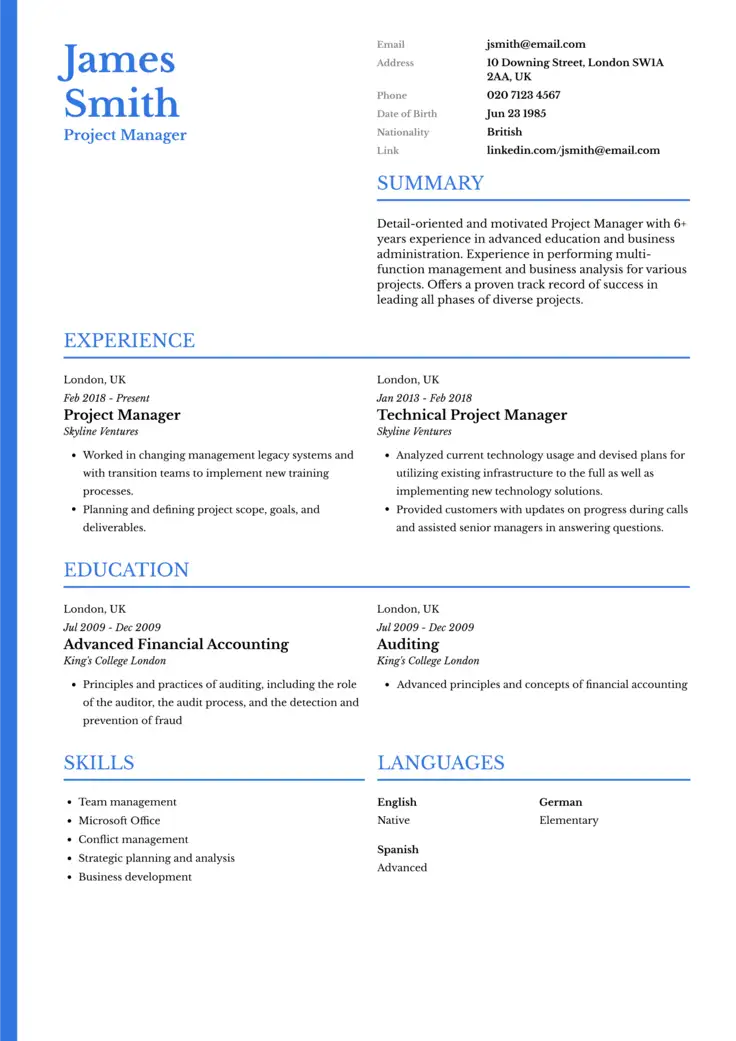Entry-Level Resume Writing Guide
Get a headstart with an entry-level resume format

Entry-level resume writing involves studying the candidate and their goals in order to construct an effective, customized resume for a new or different line of work.
When it comes to creating an entry-level resume, the case may be that the applicant does not have very much or relevant work experience for the position they’re interested in.
It’s also important to understand the difference between first resumes for teenagers, for college students and freshers, a first job resume, and entry-level. The latter focuses more on building a career in that specific area.
This means that standing out in the application process for an entry-level position can be somewhat difficult, which is why we’ve created this writing guide to help entry-level jobseekers compile a comprehensive, tailored resume to kick start their career.
But do not worry! There are many ways of catching the eye of potential recruiters through a resume without work experience by inviting the reader to get to know your character, skills, potential, and other achievements that make you the ideal entry-level candidate.
Tips for writing your entry-level resume
Due to the general nature of entry-level candidates having little to no work experience, the content and layout of these types of resumes are crucial to attracting potential employers.
Check out the following guide to find some tips and tricks of the trade for writing entry-level resumes:
The hardest thing about writing an entry-level resume is deciding what the goal is; which direction the applicant wants to go in. Once that is clear, the rest will practically write itself.
If you need help figuring this out, try answering the following questions to get a clearer idea of the target audience for your resume:
- What work or projects have I done in the past that motivate me?
- In which field or profession can I see myself in 10 years?
- What skills do I have that can be applied to an occupation?
With the objective in mind, the candidate can start by choosing which format is best for an entry-level resume and specifically the ideal resume structure for each position or company they apply to.
There are 3 main resume formats which include the most popular chronological resume, the functional (skills-based) and combination or hybrid resume.
Depending on each individual’s background and skills it may be preferable to use one of the less traditional resume types such as the functional or combination resume which either focuses more heavily on the qualities and attributes of each candidate or emphasizes both skills and work experience without highlighting one more than the other. These are often optimal for applicants with little to no professional experience such as students or individuals seeking entry-level positions.
- To complete a winning entry-level resume, applicants should demonstrate various marketable skills and relevant industry knowledge through the different areas they include in their document, detailing the ways they’ve earned or developed these qualities.
- Another top tip when writing a resume for freshers or graduates with little to no work experience is the inclusion of keywords. The importance of keywords cannot be stressed enough as it is the best method for passing Applicant Tracking Systems (ATS) and grabbing the attention of hiring managers who are looking for specific attributes for each position.
💡Tip
Use the job description as a guide to find the best keywords for each vacancy
- Finally, before sending an entry-level resume, it is essential that all candidates review their final resume to ensure that it is correctly adapted for the position offered. This means including the appropriate keywords and relevant information. Perhaps most importantly, check that the polished entry-level resume does not have any typos or mistakes, because even a small error can lose the applicant the chance at an interview for their dream job!
Remember, if you’re not sure of how to write an entry-level resume from scratch, you can either choose from a selection of entry-level resume templates to help or even use an online resume builder as a guide.
Writing your first resume: Sections to include
No matter the resume format chosen, each entry-level resume should include the following sections as standard and provide all the relevant information to the prospective employer clearly and concisely in one place.
Objective
At the very beginning of all entry-level resumes, candidates should supply a brief statement regarding their career objective which should be no more than 3-4 lines.
This part is vital to capture the attention of the Hiring Manager or HR personnel who will be reviewing resumes to find suitable candidates for the interview stage.
To make it through this first step, it is essential to include in these few lines the most important skills that a candidate will bring to the position, making sure to use keywords from the job description, a reference to their relevant experience, and if applicable, their credentials.
Education
The education section plays an important role when writing resumes for freshers or those just out of college, as the candidate may have little to no experience in the workplace and will rely more heavily on their academic achievements. According to the AACU, 95% of recruiters give hiring preference to candidates with college degrees.
Each degree, course, or diploma should be separated and detailed individually with corresponding names, dates, awarding bodies, and grades if applicable, beginning with the most recent and following a chronological order. We only recommend including your GPA if it is 3.0 or higher.
Also, this is the best area to show off your academic awards and accolades that you’ve gained through research, investigation, participating in school or college societies, or through extra-curricular courses. Here you will find a complete guide on how to write and format the education section on a resume.
Experience
Within the Work Experience section of an entry-level resume candidates should detail any paid or unpaid previous jobs they have held whether full or part-time, temporary or permanent contracts as well as internships and voluntary positions, indicating the dates, roles, companies and locations for each.
Additionally, an entry-level applicant should include in their resume any leadership positions they have undertaken and describe the responsibilities, achievements and improvements accomplished through their participation.
This area should be adapted to fit the role or sector that the applicant is applying for using specific keywords and including action verbs to identify areas of expertise and general abilities. Only supply relevant work experience that can be tailored to fit the vacancy.
Skills
In entry-level resumes the skills section is vital. It helps to market a candidate and allows potential employers to understand each individual profile. It is essential to make this part of an entry-level resume because an applicant needs to highlight their suitability for the position through their abilities.
In this section, entry-level candidates can showcase their technical and practical skills including IT programs, languages, and ‘soft skills’ which allure more to the individual character, professional manner, and their working methods. A study by LinkedIn suggests that 80% of employers want to see good soft skills from potential hires.
It is also important to include keywords from the job description and vacancy advert as well as adapt the top skills to fit the role adequately.
Luckily for entry-level candidates, Hiring Managers are often used to seeing resumes from freshers who do not have much professional experience. This means they will be paying more attention to the skills sections to find out if the candidate possesses the correct skill set for the job.
First Resume for a Teenager
As young students reach an age where they start to look for first jobs or summer work, they come up against the first challenge in the job hunt: resume writing!
And although resume writing for teenagers can be tough at times, nothing is impossible!
Read on for tips on how to write a teenager’s first resume.
- First things first, as young people often have little to no paid work experience to detail, it is recommended that entry-level candidates use a functional or skills-based resume format to showcase a blend of skills and activities that benefit teenage jobseekers.
- Secondly, as an extra support there are hundreds of specific first job or teenage resume templates to use which are hugely advantageous providing a structure, advice and examples for first resume writers.
- The next step is to consider the content of a teenager resume, including the headings and texts. Teenagers are often active participants in social and athletic groups which allow them to develop skills and experiences that are crucial to mention on a first resume. These activities can be detailed under the headings ‘education,’ ‘experience,’ ‘extra activities,’ ‘achievements,’ etc.
- Finally, when the content is compiled, it is vital that a teenager ALWAYS edits and reviews the first resume as much as possible; even ask a teacher, coach or parent to take a look for you to ensure 100% that there are no grammar or spelling errors, confusions or irrelevant information which could put a hiring manager off contacting you.
Whether you’re looking to go straight into work from school or need a first resume for an internship or college application or an entry-level position in a business where you’d then like to work your way up the ladder, a general rule to follow is use your unique knowledge and individuality to stand out so that the potential employer gets a feel for what kind of worker you will be.
Entry-Level Resume Templates
Take a look at our entry-level resume template library for the best resume samples for entry-level positions and choose the one that can be best customized to your needs.
A useful tool for learning how to make a resume for entry-level positions is to use a resume example which can serve as a basis for all the positions you apply for.
Although these samples give examples of what to put in each resume section, it is essential that all candidates remember to adapt their resume to their chosen field and the specific vacancy available.
Templates like this offer you a tried-and-tested structure to take as a starting point and also provide advice on how to complete each resume section with guides as to what to include and what you should avoid in order to attract the right employers.
Making an entry-level resume which stands out in the search for a job can be made simpler also by employing an online resume builder. Resume creators allow jobseekers to make and download their finished resumes straight from the internet to start applying right away.
These expert-approved resume templates for professionals highlight the skills and experience that each individual includes and allows the jobseeker to improve the impact of their application.

